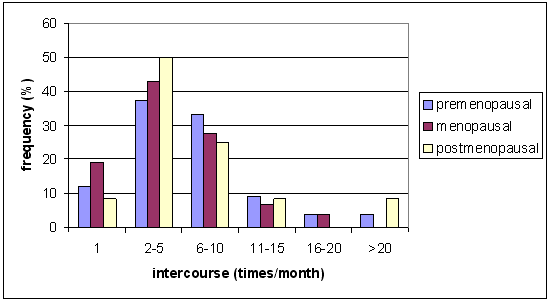Questionnaire
Summary of Contraception and Safe Sex
Results posted: July 11 2008
Thank you to all 286 women who took time to fill in our questionnaire on contraception and safe sex.
In a previous survey it was shown that an active sex life is thought to be important. Of respondents who answered the question “How important was an active sex life?” 90% in the premenopausal group said yes, 87% of women undergoing the change said yes and 92% of women who were through the change agreed that an active sex life was important. Figure 1 shows that women in the same three groups in this recent survey have similar frequencies of sexual activity, challenging the perception that sexual activity decreases through the menopausal transition.
In this new survey, the majority of respondents had a male partner and were sexually active. Just over half were going through the change (54%) and 39% were premenopausal. HRT is often commenced when contraception is still required and 97% were correct in saying that HRT is not a contraceptive.
Of great concern is that over a quarter of women (28%) who were sexually active either in the premenopausal group or undergoing the change and were still at risk of pregnancy, were not using any contraception. In these two groups approximately 10% of women had experienced contraception failure and 27% of women had used emergency contraception in the past while another 27% had never heard of it.
Types of contraception used
The most popular contraceptive used in the premenopausal group was the oral
contraceptive pill with 27% of women using it, followed by 25% using condoms,
4% using male sterilisation and 3% female sterilisation. 37% of respondents
in this group were unhappy with their method of contraception.
In the group undergoing the change, 25% of couples used condoms, 8% used the oral contraceptive pill, 13% used male sterilisation and 6% used female sterilisation. At least 35% of respondents in this group were unhappy with their method of contraception.
In women who had undergone the change 58.3% of couples used condoms, and 17% were unhappy with the contraception used. The numbers in this group are small and therefore the results must be interpreted with caution.
Facts about “the pill”
Overall, 16-17% of women in the premenopausal group and in the group undergoing
the change were unaware that the pill can be used to stabilise hormone fluctuations.
This contrasted with only 8% in the postmenopausal group.
In response to the statement “Oral contraceptive pill should never be used after the age of 35 under any circumstances”, the most likely group to get this wrong was the premenopausal group at 13% compared to the other two groups where only 0-6% got it wrong. The oral contraceptive pill can be continued up to the age of 50 in healthy non-smoking women.
Stopping contraception
The question asking about “When to stop contraception if using hormonal
contraception” was not answered correctly by 9%. The correct answers
are: if you are over 50 and your periods stop then you should carry on
using contraception until you have a year of no periods. If your periods stop
prior to 50 then you should use contraception for a further 2 years as long
as there are no more periods.
60% of respondents correctly stated that the oldest mum to conceive naturally in the UK was 54.
However 65% were unaware that there are more terminations (abortions) of pregnancy performed in women over 40 than in any other age group (per total pregnancy rate).
Hazards of pregnancy at older age
The majority of respondents (88%) were aware that pregnancy is more hazardous
for the older women and 82% were aware that pregnancy at an older age is
more hazardous for the baby. 94% knew that the incidence of abnormalities
in the baby increases with maternal age.
Sexually transmitted infections
94% of respondents were aware that the number of cases of Chlamydia is rising
but 31% were not aware that it also rising in the older women. Approximately
10% said that if they entered a new sexual relationship they wouldn’t
use condoms even if contraception was not required. The most common reason
offered for not using condoms was that either the women or the men don’t
like them.
Conclusion
Women wish to continue having an active sex life and are aware that the risks
of pregnancy on the mum and the baby increase with age. Women are aware that
HRT is not a contraceptive and only one tenth of women were unaware of when
to stop hormonal contraception. The majority of women were aware of the age
of the oldest mum in the UK to conceive naturally yet one quarter of women
who could potentially fall pregnant were not using contraception and roughly
the same number are unaware of emergency contraception. Of those using contraception
as many as one third were not happy with it. The majority of respondents
were unaware that the highest percentage of terminations was performed in
women over 40. Almost one third of respondents were unaware that chlamydia
is increasing in older women and one tenth would not be prepared to use condoms
if entering a new sexual relationship.
With a large range of very effective contraceptive methods available, it is surprising that many women are at risk of unplanned pregnancy and that of those using contraception, many were unhappy with the method used. It appears from our survey that there is a great need to provide information to women on contraception and safe sex, at all age groups.
Figure 1. Comparison of frequencies of intercourse between women who are premenopausal, women undergoing the change and post menopausal women.

